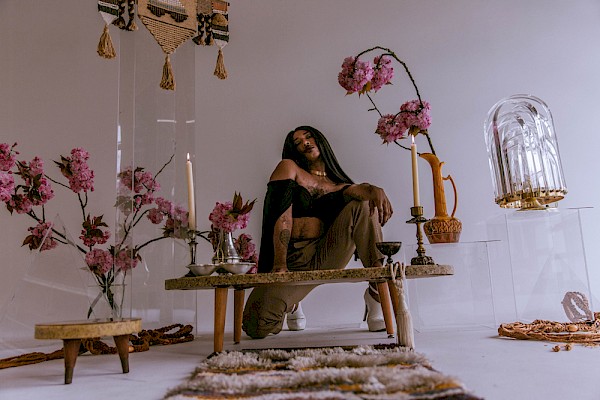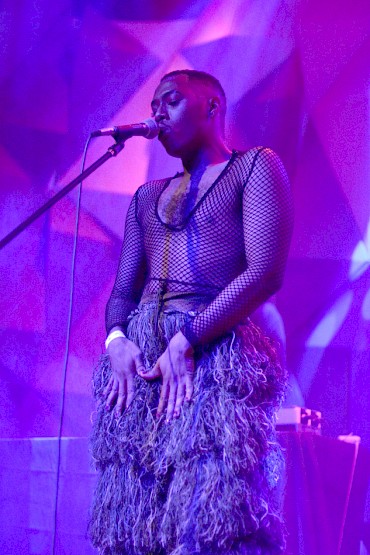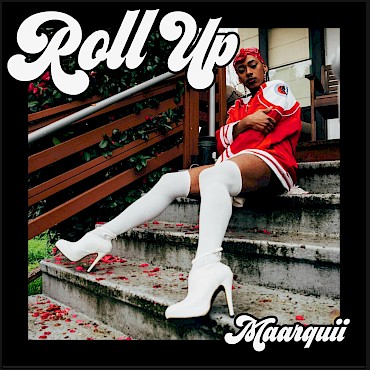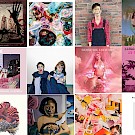 Maarquii: Photo by Evan Atwood“Roll Up” is “a summer anthem,” the Portland hip-hop artist Marquise Dickerson says, “but also true to what JVNITOR and I do.” Better known as Maarquii, the thumping hot cut is your first glimpse of the new album C.A.B.O., due out later this year, and the third project with JVNITOR, comprised of producers Derek Stilwell and Saint Michael Lorenzo.
Maarquii: Photo by Evan Atwood“Roll Up” is “a summer anthem,” the Portland hip-hop artist Marquise Dickerson says, “but also true to what JVNITOR and I do.” Better known as Maarquii, the thumping hot cut is your first glimpse of the new album C.A.B.O., due out later this year, and the third project with JVNITOR, comprised of producers Derek Stilwell and Saint Michael Lorenzo.
“It’s got an island feel to it,” the 27-year-old emcee and dancer says. The music and beat incorporate Dickerson’s “deep love for reggae and dancehall” while the lyrics (and video) show off Maarquii’s unique blend of take-no-shit fierceness and human longing.
 Maarquii at Holocene for this year's Soul'd Out Music Festival in April—click to see more photos by Brendon QuinnShot by Evan Atwood and starring Maarquii, Portland visual artist Rakeem Salt (as the referee), singer Dom Blvd (rolling up and puffing on a blunt), and local makeup artist and stylist extraordinaire Kerry Yamaucci (as the friend), the video also incorporates Dickerson’s family of origin’s love of basketball.
Maarquii at Holocene for this year's Soul'd Out Music Festival in April—click to see more photos by Brendon QuinnShot by Evan Atwood and starring Maarquii, Portland visual artist Rakeem Salt (as the referee), singer Dom Blvd (rolling up and puffing on a blunt), and local makeup artist and stylist extraordinaire Kerry Yamaucci (as the friend), the video also incorporates Dickerson’s family of origin’s love of basketball.
“The basketball court is a nod to challenging masculinity. All my siblings ball but me, so I put my body and my identity into that hyper-masculine space,” Dickerson says. As the creative director on the video, Dickerson had control over the characters and the setting. After tossing out a few earlier ideas, including one where Maarquii was a sideline cheerleader, Dickerson decided those weren’t working and inserted themselves on to the court. “The [basketball] court is mine. I didn’t want [the referee] playing on my court. There are no other players on the court.”
C.A.B.O. is the album where Dickerson explores who they are all on their own. “This is the first project where I’m grown Maarquii. The songs are about what I like, what I want, and what I need. It’s about expressing boundaries, but also how I want to be scooped up, and how I want to see how you live. It’s born out of a newness.”
The upcoming album promises to be provocative in that discovery of a self who resists what they call the “modifier, modifier” before the words hip-hop artist. C.A.B.O. is an acronym for “Cut A Bitch Off” and Maarquii is here to be themselves with no apologies and no modifiers necessary.
 Directed by and starring Maarquii, watch the video for “Roll Up” below, the first release from their new album 'C.A.B.O.' due out late summer/early fall“In the context of the album,” Dickerson says, “I’ve been exploring how I can find a balance of what I want to use my platform for. I want to spark the conversation about being a black, non-binary femme because I don’t know how to not be truthful. Hip-hop is a hyper-masculine space, [yet it] has always been punk rock in the sense that it often challenges the status quo. But what the hip-hop industry has to understand is there are other narratives besides cis-hetero ones in the black community that deserve to be heard and respected. What I bring is a different perspective.”
Directed by and starring Maarquii, watch the video for “Roll Up” below, the first release from their new album 'C.A.B.O.' due out late summer/early fall“In the context of the album,” Dickerson says, “I’ve been exploring how I can find a balance of what I want to use my platform for. I want to spark the conversation about being a black, non-binary femme because I don’t know how to not be truthful. Hip-hop is a hyper-masculine space, [yet it] has always been punk rock in the sense that it often challenges the status quo. But what the hip-hop industry has to understand is there are other narratives besides cis-hetero ones in the black community that deserve to be heard and respected. What I bring is a different perspective.”








